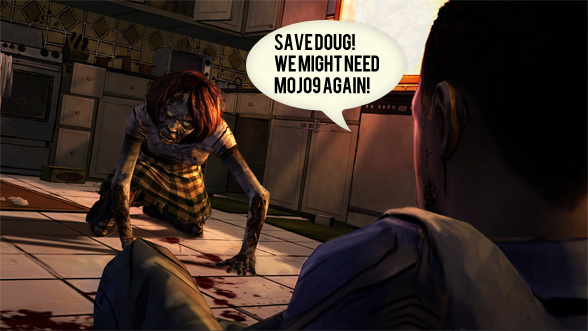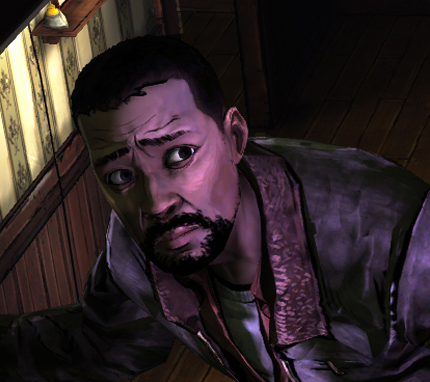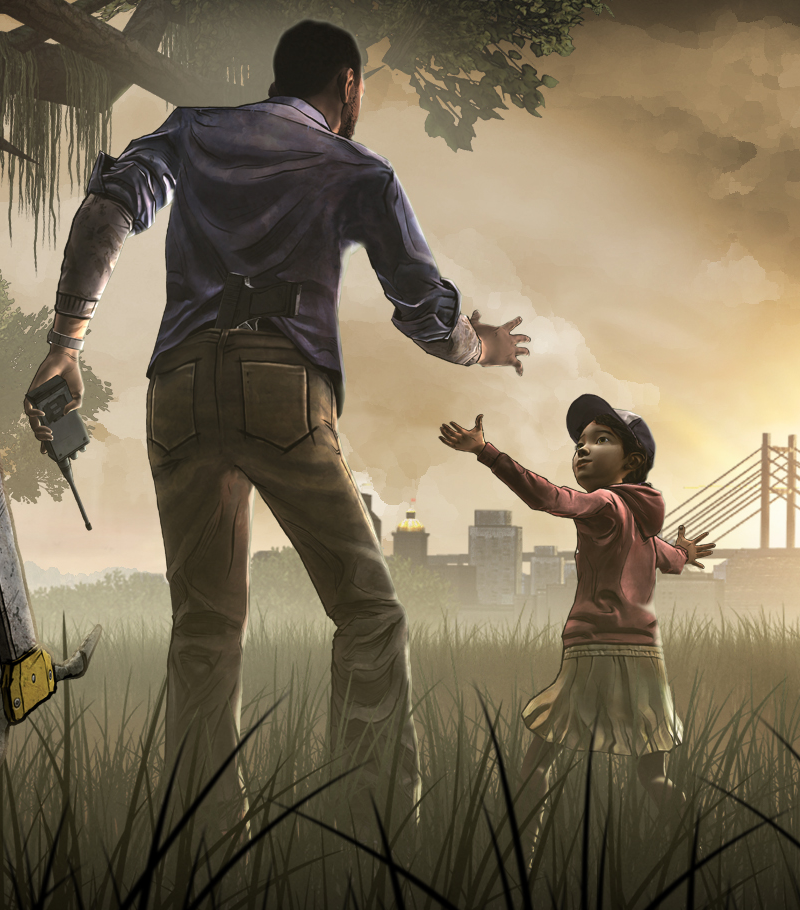Articles

The Walking Dead Long Road Ahead / Around Every Corner
Okay, let’s get this out of the way at the start: I hate zombies. I hate zombie movies, I hate zombie TV shows, and I especially hate zombie video games. I am not of the volition that zombies are a real thing which can be dropped into a story and accepted without further explanation, like a shark or a hurricane, and I find it hard to care when corpses start attacking characters for no apparent reason. It’s nothing personal, it’s just me. But needless to say, when I learned that Telltale were to make an episodic licensed zombie adventure game, I could not have cared any less.
I think the thing that ultimately convinced me to play it – aside from the demo, which was visually impressive and genuinely promising – was a comment I read somewhere. It was the suggestion that in this scenario, the zombies were not the problem – it was the survivors you had to watch out for. Now, four episodes in and nearing the end, that statement carries more meaning than I could ever have imagined.
For most of the first two episodes, as harrowing as the experience was, my conscience was mostly clear. I hadn’t screwed anyone over, and while I made my feelings known to those I disagreed with, I recognised the importance of keeping the group together. All along my sense of responsibility towards Clementine was growing, but I never thought it would cause me to do something I’d actually be ashamed of. Then episode three came along… and with it, the decision to abandon another character in the middle of nowhere to die a violent, agonising death. I justified it to myself in all sorts of ways, but I don’t ever forget that I did that.
Survival clearly makes people do desperate things. But the truth of it is, at this point – and I can admit this only now that I realise it in the plainest terms, after the brutal twist at the end of episode four – I don’t care about surviving. I don’t know when it happened exactly, but my own survival isn’t important. It was clear by the middle of episode 3 that there would be no happy ending in this story. It got so relentlessly bleak, so draining, that I actually had to have the conversation with myself: what is the point of carrying on? What can I possibly find that will make this all okay?
Then came the little tug at my hand. And in the starkest moment of depression, I forced a smile and said something encouraging. And Clem laughed, and I realised that I had my answer.

At that point it moved from subconscious to conscious, and I actively starting making decisions designed to maintain Clementine’s innocence in the face of all this horror. I never lied to her, I never got her hopes up when things got really bad, or yelled at her when she did crazy, dangerous things. I just needed her to get through this with as few scars as possible. I still don’t really know why.
And for those who’ve played episode four, you know that she’s gone now. I don’t know how it went down for you, but the last thing I said to her made her cry. The futility of my stupid plan has finally blown up in my face – how the hell could I think, even for a second, that I’d be able to shield her from all of this? Even as I taught her how to fire a gun, there was a part of me that was wilfully ignorant about the reality of it. And at the same time, I’m terrified that I protected her too well – that she’s out there now, blind to the dangers, and I’m powerless to do anything about it. Is this how parents feel when their kids vanish in the mall? Jesus.
There's no doubt at all that the game elicits an emotional response, and at this point it does it with such staggering ease that it’s starting to make all other narrative games seem like a bit of a joke. I can’t count the number of times I’ve been given a mission in a game to protect another character, or to travel from A to B without letting something explode. I play the mission and sometimes it’s fun, and sometimes dumb AI keeps me frustrated for hours, and there’s really no pattern to it aside from the fact that I fundamentally don’t care about the object in the middle of it all. But if it isn’t clear to you at this point, I really fucking care about Clementine.
This is an incredible achievement. In writing things tend to get broken into two camps: what is shown and what is told. Telling is easy – anyone can just tell the player how Lee feels, but that won’t make them actually believe it. But telling is the cornerstone of video game narration, and I haven’t seen a game shrug it off with such style since Portal came out. No-one ever had to tell you that GLaDOS was psychotic because you were shown it at every opportunity. You realised it all on your own because of the way she behaved. And Telltale have managed to achieve the same thing – although it’s clearly what the designers want us to think and to experience, they’ve never actually told us a goddamned thing. As a result, this is a remarkably personal experience.
I know some people don’t like this stuff. They can’t get away from the gameness of it, and they consider the choices to be unfair because they don’t know what the ultimate outcome is going to be. It always comes back to the same basic sentiment: maybe I made the wrong decision. My answer to that is always the same: when your favourite character in the movie gets shot half way through, what do you do? Storm out, furious that it hasn’t worked out how you wanted it to? Or do you accept it as part of the story you’re being told? That the writer is doing something to elicit an emotional response? Because maybe, somewhere, buried in that emotion, is a basic form of truth that speaks to all of us?

Others may make an argument against the difficulty of the puzzles. Well, I hear you. This is a stripped down adventure game, but that’s because it isn’t really a traditional adventure game at all. We are no longer solving puzzles by using inventory items on static machines – the people are the puzzles now. It’s a cop-out in a way because there’s no right or wrong way to make a group of people work together – as compared to, say, busting out of Phatt Island jail – but that doesn’t mean that making these choices isn’t just as hard.
I guess I’m just too invested in this thing now to see it any other way. The further I progress the more it feels like this is a landmark game, something genuinely important and different from its predecessors. And isn’t that what we should be demanding of Telltale? To take risks? We’ve chided them for relying on licenses, or sequels, and now at long last they’ve made something that’s unlike any other game you can buy.
The Walking Dead is a triumph. You have to play it now, while you still have to wait for the last episode. Because that’s the only way you will ever understand the agony that comes from not knowing if Clem is okay.
Hang in there, Clem. I’m coming for you.